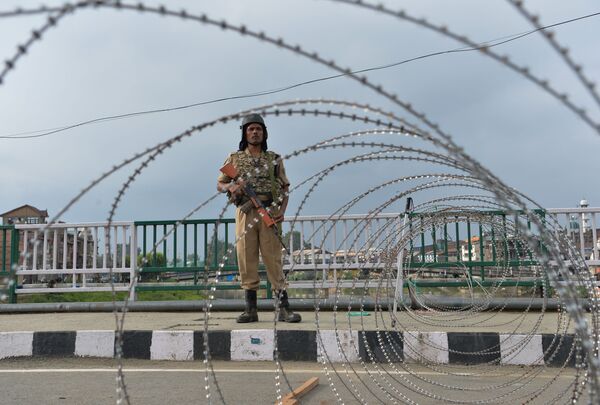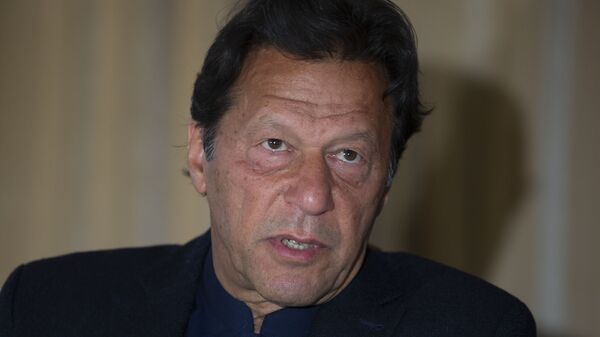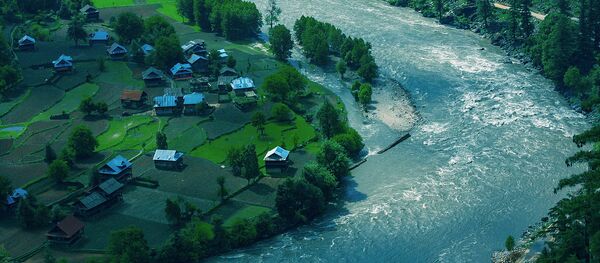In his continued efforts to highlight the plight of Kashmiris on the Indian side, Pakistan's Prime Minister Imran Khan marked the one-year anniversary of the revocation of Article 370 with an address in Pakistan-administered Jammu and Kashmir's (AJK) assembly on Wednesday.
We have also depicted the aspirations of the Kashmiri people & our commitment to UNSC resolutions in the political map of Pakistan released yesterday.
— Imran Khan (@ImranKhanPTI) August 5, 2020
I welcome the UNSC meeting to discuss the serious situation in Occupied Jammu & Kashmir. It is for the first time in over 50 yrs that the world’s highest diplomatic forum has taken up this issue. There are 11 UNSC resolutions reiterating the Kashmiris right to self determination.
— Imran Khan (@ImranKhanPTI) August 17, 2019
Khan Did Not See It Coming
However, India’s Modi-led government’s “masterstroke” was not even anticipated by Khan or any other world leaders a year ago when New Delhi deployed thousands of additional troops, shut down mobile Internet, asked pilgrims and tourists to return, banned public meetings, closing down educational institutions, and placed more than 500 political leaders, including three former state chiefs, under house arrest.
I condemn India's attack across LOC on innocent civilians & it's use of cluster munitions in violation of int humanitarian law and it's own commitments under the 1983 Convention on Certain Conventional Weapons. UNSC must take note of this international threat to peace & security.
— Imran Khan (@ImranKhanPTI) August 4, 2019
Unaware of India's forthcoming action in Kashmir, Imran Khan had suggested accepting US President Donald Trump’s mediation offer on Kashmir, which Trump made after the G20 summit.

Deal With It Yourself, Say World Leaders
Khan’s effort to garner the attention of the world at the UNSC yielded no results, as a closed-door meeting at the request of China was an exchange of arguments and reports. However, Chinese envoy to the UN Zhang Jun, expressing concerns, urged all parties not to take unilateral action that could further aggravate the situation.
While the Pakistani prime minister continued to bring up human rights in the valley amid the complete lockdown, a 27-member delegation of European Union parliamentarians visited Kashmir and expressed satisfaction over the progress.
Delhi: Members of European Parliament called on Prime Minister Narendra Modi at 7, Lok Kalyan Marg today. The delegation would be visiting Jammu and Kashmir tomorrow. pic.twitter.com/8Syz2DWcED
— ANI (@ANI) October 28, 2019
However, much to Khan’s disappointment, an EU member said that the international delegation “fully support India in its efforts for lasting peace and end of terror". Henri Malosse, a member from France said, “Pakistan is funding terror groups” in Kashmir; but at the same time, he favoured India and Pakistan talking to resolve their differences on the issue.
Even the US, which had earlier offered mediation on the matter, said that the two countries can solve the issue on their own.
The only countries supporting Pakistan in its quest have been China, Malaysia, and Turkey. Expressing anger over the lack of support from Muslim countries on Kashmir, Khan accused them of remaining tight-lipped over economic relations with India. He made an effort to point the focus at the Delhi riots in February, where he termed Modi’s government as a threat to Indian Muslims.
I want to thank Supreme Leader Khamenei, & President Erdogan, for speaking against the oppression & massacre of Muslims in India & Kashmiris in IOJK by the Hindu Supremacist Modi regime. https://t.co/sUeIJ81q58
— Imran Khan (@ImranKhanPTI) March 5, 2020
Predictions Gone Wrong
Imran Khan even predicted a bloodbath in the valley following the end to the curfew, as Kashmiris would continue to fight for their right to self-determination. However, the voices of independent Kashmir are coming to an end, as the face of Kashmir’s separatist movement for around three decades, Syed Ali Shah Geelani, recently announced his resignation from the political alliance formed to advocate for Kashmiri independence.
As the world watches the worst violation of human rights in IOJK, Modi is now fearful because he knows the moment the siege is lifted there will be a bloodbath - which would be the only way to subdue the Kashmiri people.
— Imran Khan (@ImranKhanPTI) October 18, 2019
Other political leaders from the Valley, such as former state chief Omar Abdullah, has asked for the reinforcement of the status of state to Jammu and Kashmir, which was made union territory after the revocation of its special status.
Moreover, data released by the Indian government has revealed a decrease in the number of stone-pelting incidents in the valley and an improving law and order situation. Post 5 August 2019, out of a total of 1,391 incidents, 1,109 incidents (80 % of the total) were reported during August, September, and October.
Law and order incidents fell from 370 per month to the current rate of 28 per month. The Indian government has also claimed that post 5 August 2019, recruitment of local youths to terrorist organisations has fell by 42% (from 172 to 100).
Khan expressed his discontentment over the world in discourse on Kashmir. While protests in Hong Kong over its autonomous status were continuing to make headlines, the Pakistani prime minister urged the international media to focus on Jammu and Kashmir as well.
I am puzzled as to how international media continues to give headline coverage to Hong Kong protests but ignores the dire human rights crisis in IOJK - an internationally recognised disputed territory illegally annexed by India with 900k troops imposing a siege on 8mn Kashmiris
— Imran Khan (@ImranKhanPTI) October 11, 2019
India Holding Its Ground
India has not only dismissed Imran Khan’s statement, it has even claimed the Pakistani side of Jammu and Kashmir and the Gilgit-Baltistan to be part of its territory. It first began with the weather bulletin on the region, later its External Affair Ministry asked Pakistan to “vacate all Indian territories under its illegal occupation”.
Recently, Indian Defence Minister Rajnath Singh claimed that soon people in “Pakistan-occupied Kashmir (PoK)” will demand to be part of India. New Delhi has not paid heed to comments or reports from other countries on Kashmir.
In March, India's External Affairs Ministry rejected a joint declaration issued by the Chinese and Pakistani presidents that referenced the contested Kashmir region, saying it was an internal issue.
India and Pakistan have been in conflict over Jammu and Kashmir since independence in 1947. Both the countries claim parts of the region as their own territory while the valley has seen demand for self-determination for three decades.
Both South Asian countries have fought three wars over the issue. The relations deteriorated with the abrogation of Article 370 last year. While Pakistan accuses India of oppressing Kashmiris, India has claimed that it is because of infiltration from across the Line of Control that the situation hasn't improved in Kashmir.








